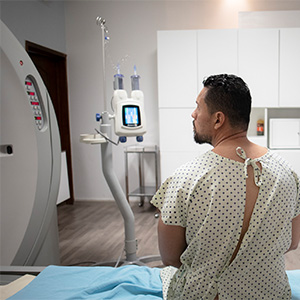PSA test results: What you need to know

A prostate specific antigen test (PSA), often called a PSA test, is a common blood test used to look for signs of prostate cancer. Your PSA test results will show the amount of a particular kind of protein, called prostate specific antigen, in the blood. While a PSA test can be an important screening tool for prostate cancer, the results can be affected by many factors, and an elevated level of PSA in the blood is not always cause for alarm.
Read on to learn what a PSA test is, why your doctor may recommend one, and what your results may or may not mean about your health.
In the Inspire Prostate Cancer Community, members share their personal experiences of living with kidney disorders and how to find support. This content should not be used as a substitute for professional medical advice, diagnosis, or treatment. As always, consult with your doctor before trying any new treatments or medications.
What is prostate cancer?
Prostate cancer occurs when a tumor or cancerous growth forms in the prostate, a part of the male reproductive system. The prostate is the organ predominantly responsible for the production of semen, and is also important to achieving erections. About the size of a walnut, this organ is located inside the body, between the rectum and the base of the penis.
Prostate cancer is one of the most common forms of cancer in men, affecting 1 in 8 men over the course of their lifetimes. It’s also a highly treatable form of cancer, with a five year survival rate of nearly 100%. But it is important to catch prostate cancer early to achieve the best outcome for treatment.
Because early detection is so important, your doctor may recommend that you take a PSA test to screen for prostate cancer. For men over the age of 50, your doctor may recommend this test as part of a regular screening, even in the absence of prostate cancer symptoms. Your doctor also may recommend a PSA test at any age if you are experiencing symptoms of the disease.
PSA test
A PSA test measures the presence of prostate specific antigen in the blood. Prostate specific antigen is a kind of protein produced by both healthy and unhealthy prostate cells. In most cases, men without prostate problems have relatively low concentrations of PSA in their bloodstreams, though the exact concentration considered “normal” varies considerably based on age and many other factors.
Problems with the prostate, like an infection or cancer, can raise the level of PSA in the blood. By testing for this substance, doctors can detect when the levels in the blood are elevated. Those elevated levels can be a warning sign of problems that may warrant more investigation.
My first awareness of a possible problem was February a year ago (2018). I was 75 years old and had PSA test (a screening test for prostate cancer, as part of a yearly physical exam ... it came in 7.2, above the commonly stated norm of 6.5 for my age.
My primary care physician (Dr. Randall Hofmann), bless him, had encouraged this screening test for prostate cancer. Prior to his care I had never had a PSA, though most of my doctors had done the often maligned digital rectal exam (DRE). Indeed I had a DRE only several months before when I had seen an emergency care physician for a suspected urethral infection. All of these DREs were described to me as "negative".
I asked my primary care doctor what that 7.2 meant. His response was "it means you need to see a urologist". He referred me Dr. Scott Jennings. Dr. Jennings was a good listener, good with information, kind and a good person with whom to do business. He continues as my urologist for the duration.
Dr. Jennings retested my PSA in June and again in August. The results were respectively 8.9 and 13.2. Velocity of change not good. We needed to move forward.
My urologist suggested that we do a biopsy. Where there is a choice, I prefer minimally invasive so I asked that we do a 4K Test (a simple blood test) first. It came back indicating a 95‰ probability that a biopsy would show a high risk prostate cancer (Gleason >=7). I did the biopsy. Some discomfort / pain but manageable. The biopsy came back a Gleason 7 (4+3). It was clear at that point I was in for a ride.
Visit the Inspire Prostate Cancer Community to connect with others and read more member stories.
PSA levels by age
A PSA test can tell you the concentration of PSA in your bloodstream, but whether or not the concentration is cause for concern depends on other factors, most importantly age.
The prostate naturally increases in size as men age. A naturally larger prostate will produce more PSA even in healthy individuals. (Note that the natural growth of the prostate is distinct from another condition, benign prostatic hyperplasia, also called an enlarged prostate. This condition is not dangerous but can cause symptoms like difficulty urinating.)
Your doctor will take your age into account when determining whether your PSA tests reveals something of concern.
Treatment for prostate cancer can involve surgery, chemotherapy or radiation therapy. In some cases of slow growing prostate cancer, your doctor may elect not to treat the disease at all, opting instead for monitoring and observation.
While prostate cancer can be treated with excellent results, it can be fatal if not detected early. For reasons that are not well understood, African American men are more likely to develop dangerous prostate cancer.
I was diagnosed with thyroid cancer two years ago. Now my husband's PSA has risen from 2.8 to 3.99. I'm worried we will need to face the C word again.
He is 60 yrs old and healthy. His PSA (using BL Roche method) was 2.6 (2015),2.8(2016), 2.8(2017) and 3.99 (2018). Before 2015, the PSA screening is Total PSA and his level was 1.6 (2012), 2.4 (2013) and 2.1(2014). I sent a note to the primary doctor two years ago when his PSA was at 2.8 but the primary doctor said it was normal for his age so we did not follow up. I kind of regret now for not insisting on further testing at that time.
General guidelines for PSA levels by age
Individual variation and other factors can influence your PSA levels, but researchers have found some guidelines for PSA levels by age that can help your doctor determine if your test shows cause for concern:
For men between the ages of 40 and 50, the normal range is 0 to 2.5 ng/ml
For men between the ages of 50 and 60, the normal range is 2.5 to 3.5 ng/ml
For men between the ages of 60 and 70, the normal range is 3.5 to 4.5 ng/ml
For men between the ages of 70 and 80, the normal range is 4.5 to 5.5 ng/ml
What other factors can affect PSA test results?
While an elevated PSA level can be an indication of prostate cancer, the levels of PSA in your blood can also be affected by a wide range of other factors.
Vigorous exercise
Intense exercise, particularly bike riding, can lead to elevated levels of PSA. Biking in particular puts pressure on the perineum and can cause cells in the prostate to release more PSA.
Sexual activity
Ejaculatiion can raise the levels of PSA in the blood temporarily. If you’re planning to have a PSA test, avoid sexual activity for a few days prior.
Individual variation
All bodies are different, and some men simply have higher PSA levels than others. Your doctor may suggest that you have more than one PSA test if the first result shows elevated levels, in order to determine your natural baseline concentration.
Should I have a PSA test?
If you’re considering a PSA test in the absence of symptoms, it's important to speak with your doctor first. In recent years, some medical professionals have started to reevaluate whether general screening with PSA tests makes sense.
While the PSA test itself does not carry significant risks, an elevated PSA test can lead to follow-up treatment that can have substantial side effects. An elevated PSA test may prompt your doctor to recommend a prostate biopsy to check for cancerous cells in the prostate, for example. This procedure involves the removal of a small piece of tissue for testing, and in rare cases can lead to infection or other complications like erectile dysfunction.
Further support
Many men will face the difficulty of prostate cancer in their lifetimes, and peer support can be a great way to gather information and feel connected. The Inspire Prostate Cancer Community is full of others facing the same challenges who are ready to offer help and advice.
Sources
https://www.cancer.org/cancer/types/prostate-cancer/about/key-statistics.html
https://www.uspreventiveservicestaskforce.org/uspstf/recommendation/prostate-cancer-screening
https://www.mayoclinic.org/tests-procedures/prostate-biopsy/about/pac-20384734
Disclaimer
Member comments have been lightly edited for length and clarity. This content is for general informational purposes only and does not necessarily reflect the views and opinions of any organization or individual. The content should not be used as a substitute for professional medical advice, diagnosis, or treatment. Please consult your healthcare provider about any questions you may have regarding a medical condition.




